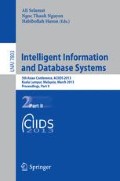Abstract
The use of parallel and distributed systems has become very common in the last decade. Dividing data is one of the challenges in these types of systems. Divisible load theory (DLT) is one of the proposed methods for scheduling data distribution in parallel or distributed systems. Many researches have been done in this field, but scheduling a multi-installment heterogeneous system with two-level hierarchical topology in which communication mode is blocking has not been addressed. In this paper, we find the proper size of task for each sub tree. Finally, in the experiments section, we show that the proposed methods work correctly and give us the best scheduling.
Access this chapter
Tax calculation will be finalised at checkout
Purchases are for personal use only
Preview
Unable to display preview. Download preview PDF.
References
Robertazzi, T.: Ten reasons to use divisible load theory. Computer 36(5), 63–68 (2003)
Shokripour, A., Othman, M.: Categorizing DLT researches and its applications. European Journal of Scientific Research 37(3), 496–515 (2009)
Mingsheng, S.: Optimal algorithm for scheduling large divisible workload on heterogeneous system. Appl. Math. Model. 32, 1682–1695 (2008)
Shokripour, A., Othman, M., Ibrahim, H.: A New Algorithm for Divisible Load Scheduling with Different Processor Available Times. In: Nguyen, N.T., Le, M.T., Świątek, J. (eds.) ACIIDS 2010. LNCS, vol. 5990, pp. 221–230. Springer, Heidelberg (2010)
Shokripour, A., Othman, M., Ibrahim, H., Subramaniam, S.: A new method for job scheduling in a non-dedicated heterogeneous system. Procedia Computer Science 3, 271–275 (2011)
Jia, J., Veeravalli, B., Weissman, J.: Scheduling multi-source divisible loads on arbitrary networks. IEEE T. Parall. Distr. 99, 520–531 (2009)
Moges, M.A., Yu, D., Robertazzi, T.G.: Grid scheduling divisible loads from two sources. Comput. Math. Appl. 58(6), 1081–1092 (2009)
Shokripour, A., Othman, M., Ibrahim, H., Subramaniam, S.: A method for scheduling heterogeneous multi-installment systems. Future Gener. Comp. Sy. 28(8), 1205–1216 (2012)
Author information
Authors and Affiliations
Editor information
Editors and Affiliations
Rights and permissions
Copyright information
© 2013 Springer-Verlag Berlin Heidelberg
About this paper
Cite this paper
Shokripour, A., Othman, M., Ibrahim, H., Subramaniam, S. (2013). A New Method for Job Scheduling in Two-Levels Hierarchical Systems. In: Selamat, A., Nguyen, N.T., Haron, H. (eds) Intelligent Information and Database Systems. ACIIDS 2013. Lecture Notes in Computer Science(), vol 7803. Springer, Berlin, Heidelberg. https://doi.org/10.1007/978-3-642-36543-0_36
Download citation
DOI: https://doi.org/10.1007/978-3-642-36543-0_36
Publisher Name: Springer, Berlin, Heidelberg
Print ISBN: 978-3-642-36542-3
Online ISBN: 978-3-642-36543-0
eBook Packages: Computer ScienceComputer Science (R0)

